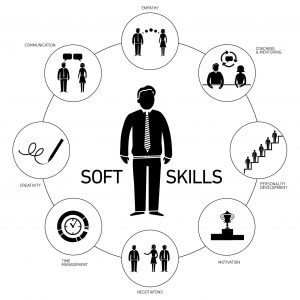
 Data Structure
Data Structure Networking
Networking RDBMS
RDBMS Operating System
Operating System Java
Java MS Excel
MS Excel iOS
iOS HTML
HTML CSS
CSS Android
Android Python
Python C Programming
C Programming C++
C++ C#
C# MongoDB
MongoDB MySQL
MySQL Javascript
Javascript PHP
PHP
- Selected Reading
- UPSC IAS Exams Notes
- Developer's Best Practices
- Questions and Answers
- Effective Resume Writing
- HR Interview Questions
- Computer Glossary
- Who is Who
The Power of Soft Skills!!
Soft Skills can be defined as “personal attributes that enable someone to interact effectively and harmoniously with other people”. This skill is indeed, one of those rare intangible abilities that can make a difference between success or failure. In this article, we will discuss the significance of soft skills and how it helps you to succeed.
We are well aware that, one needs to sharpen technical skills to get employment. While professional and technical skills might get you a job and open the opportunities, Soft skills will provide the needed icing on the cake if you really wish to succeed in this competitive world. Your work ethic, your attitude, your emotional intelligence, your communication skills and other personal attributes are some of the soft skills which are crucial for your career success.
When you are equipped with soft skills, your chances to excel as a leader will be high. Motivating, problem-solving, delegating and team building would be a cake walk in the corporate world. One should know, how to get along with people and being positive is crucial for attaining success.
Identifying the Root Cause?

The significance of soft skills is usually undervalued because of less awareness. Most of the companies expect their staff to know their responsibilities and able to communicate well. They generally believe and have a notion that employees in the organization understand the significance of being on time to work, be friendly and take initiative and offer high-quality work. Unfortunately, it is not the case with the real-time scenario.
There is a greater need to focus on soft skill training and development because if you lack, you may miss a lot of opportunities to achieve growth in your career.
The Difference between Soft skills and Hard skills
Hard skills can be tested with a well-accepted testing methodology whereas soft skills are capabilities, that are difficult to measure with testing.
The Soft Skills Gap: When your workforce has excellent technical skills, but lack soft skills, you have a soft skills gap. If your staff has soft skills and hard skills, then it certainly helps your organization to use technical expertise to full advantage.
How to find whether your organization is having a Soft Skill Gap?
- Your organization may be having a soft skill gap if client acquisition is heavy but finding difficulty to retain them.
- If you have high staff turnover and try hard to retraining people, then are chances you may have a soft skills gap.
- Lastly, when you have a number of managers, but no real leader, even then there exists a soft skills gap.
- Whenever you find difficult to capitalize on the wealth of knowledge, proficiency, experience within your team, then you must be assessing the level of communication as well as interpersonal skills, that are present in your organization.
In recent times, the workplace has evolved dynamically that cannot be ignored. The acts of presenting ideas, listening, resolving conflict and fostering an open as well as the honest work environment, all come down to know how to build as well as maintain a relationship with people. It is those relationships which allow people to participate fully in team projects, enlist support for their project and show appreciation for others.
It is significant that you need to recognize the importance of this role. Soft skill does play within your team and within yourself. It helps encourage development throughout the organization. Few

areas to examine and evaluate include –
- The degree of collaboration
- Personal accountability
- Creative thinking
- Inclusion
- People adaptability and flexibility
- Conflict resolution
- Interpersonal negotiation skills
- Clarity of communication
- Coaching
It is quite easy to determine who has the best math skills, but it is difficult to know who is best at innovation or diplomacy.
Below you can find a list of soft skills, which may be useful for your job description, resume or training plan.
Communication Skills
- Verbal Communication
- Visual Communication
- Story Telling
- Listening
- Writing
- Story Telling
- Public speaking

Leadership Skills
- Decision Making
- Strategic planning
- Crisis management
- Talent Management
- Teambuilding
- Mentoring
Influencing Skills
- Networking
- Interpersonal Relationships
- Personal Branding
- Office Resolution
Personal Skills
- Emotional Intelligence
- Stress Management
- Self-awareness
- Self-confidence
- Adaptability
- Competitiveness soft_skills3.jpg
- Empathy
- Enthusiasm
- Assertiveness
- Resilience
Creativity
- Innovation
- Design Sense
- Artistic Sense
- Critical Thinking
- Problem solving
Professional Skills

- Planning
- Organizing
- Scheduling
- Time management
- Research
- Business Ethics
- Disability awareness
- Intercultural competence
- Knowledge Management
- Process improvement
- Customer Service
- Writing Reports and Proposals
- Intercultural competence
- Business trend awareness
- Technology Trend awareness
There exist a lot of argument in the industry, whether it is possible to enhance soft skills within a few hour’s of training, especially for those individuals who have lived with those traits all their life. Yes, it is difficult, but professionals do not have any choice, if they wish to do well in their career,

they need to develop soft skills.
Be your Trainer
- Take part in team activities
- Ask your friends or family members what best and worst traits in you
- How well you manage your time
- Check, how you react when someone offers you feedback
- Live consciously
- How good are you in critiquing
For today’s workforce, soft skills are a must, it is not enough to be highly trained in technical skills. People need to develop soft skills so that they can have good interpersonal and relationship building skills and communicate and collaborate with other more effectively.
While skills are good to develop by themselves, integrating them into a systemic practice makes you develop new competencies for success.

